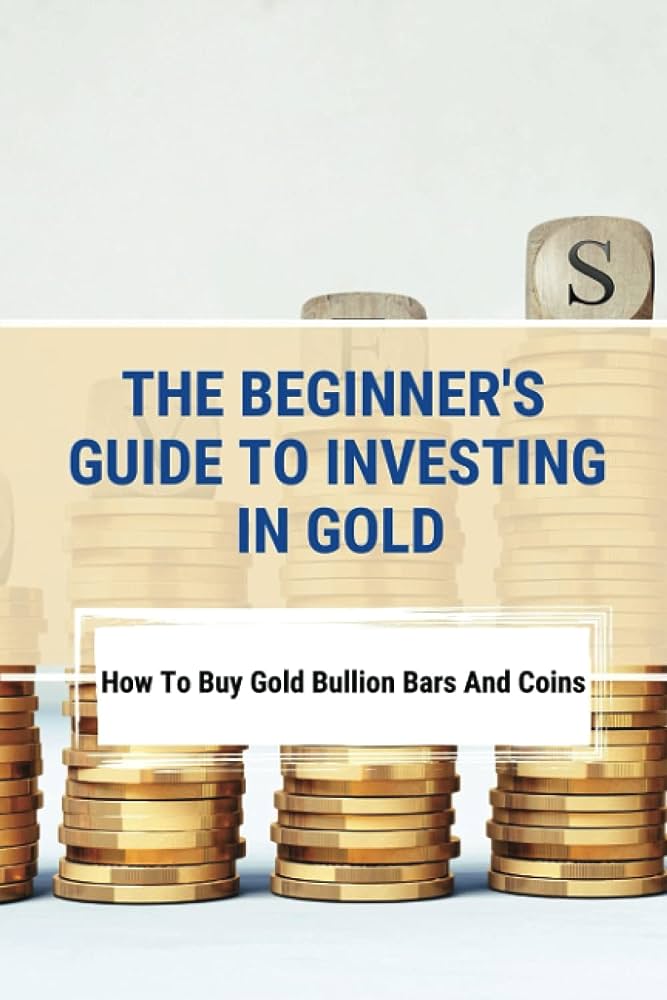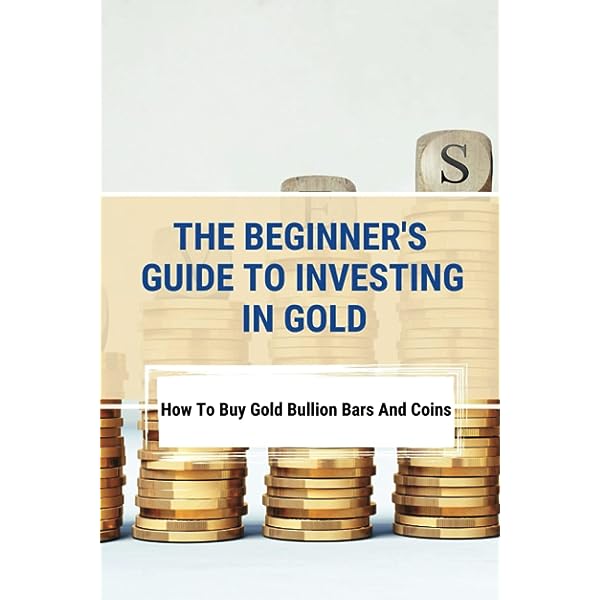Are you curious about how to get started with investing in gold in the UK? Well, you’re in the right place! This beginner’s guide aims to provide you with valuable insights on how to navigate the world of gold investment.
When it comes to investing in gold in the UK, there are a few options available to you. One popular choice is to purchase physical gold, such as gold bars or coins, which can be securely stored. Alternatively, you can invest in gold through exchange-traded funds (ETFs) or gold mining stocks. These options provide flexibility and convenience since you don’t have to worry about storing physical gold. Whether you’re looking for a long-term investment or a short-term hedge against inflation, investing in gold can be a wise decision. Remember to do your research, seek professional advice if needed, and always stay informed about market trends. Happy investing!
A Beginner’s Guide to Investing in Gold in the UK

This image is property of Amazon.com.
Choosing to Invest in Gold
Investing in gold can be a smart move for individuals looking to diversify their investment portfolio and protect their wealth. Gold has a long history of being a safe haven asset, particularly during times of economic uncertainty. The demand for gold remains strong, making it a stable and potentially lucrative investment option.
Why Invest in Gold?
Gold has several unique properties that make it an attractive investment choice. Firstly, gold serves as a hedge against inflation, as its value tends to rise when the purchasing power of fiat currencies declines. Additionally, gold is a tangible asset with intrinsic value, providing a sense of security to investors. Gold also avoids many of the risks associated with other investment options, such as stocks, bonds, or real estate.

This image is property of i.ytimg.com.
Benefits of Investing in Gold
Investing in gold offers numerous benefits. First and foremost, gold is a globally recognized store of value. Unlike currencies that can depreciate due to economic or political factors, gold has maintained its value throughout history. Gold also offers liquidity, allowing investors to easily convert it into cash when needed. Furthermore, gold investments can act as a diversification strategy, reducing the overall risk of a portfolio. Lastly, gold has the potential for significant long-term capital appreciation, making it an attractive investment for those seeking to grow their wealth.
Understanding the Risks
Although gold is generally considered a safe investment, it is not without its risks. Like any investment, the price of gold can fluctuate significantly. While gold has historically maintained its value, there are no guarantees for future performance. Additionally, investing in gold does not generate income or dividends like other investment options. It is important to be aware of these risks and consider them carefully before deciding to invest in gold.

This image is property of Amazon.com.
Types of Gold Investments
When it comes to investing in gold, there are several options available to investors. Each option comes with its own set of advantages and considerations, catering to different investor preferences and goals.
Physical Gold
Investing in physical gold involves purchasing gold bullion coins, bars, or even jewelry. This type of investment allows you to actually possess and hold the gold in your hands. Physical gold offers a sense of tangibility and security, as it is not dependent on external parties. However, it also requires proper storage and security measures to protect your investment.
Gold ETFs
Gold exchange-traded funds (ETFs) are investment funds that track the price of gold. These funds are traded on stock exchanges, allowing investors to gain exposure to the price of gold without physically owning the metal. Gold ETFs are a convenient and cost-effective way to invest in gold, as they provide easy liquidity and eliminate the need for storage and security concerns.
Gold Mining Stocks
Investing in gold mining stocks involves purchasing shares of companies involved in the exploration, development, or production of gold. By investing in gold mining stocks, investors have the potential to benefit from the appreciation in gold prices as well as the success of the mining company. However, this type of investment carries additional risks, such as the company’s operational performance and management decisions.
Determining the Right Amount to Invest
Before investing in gold, it is important to determine an appropriate amount to allocate to this asset class. Consider the following factors to make an informed decision:
Calculating Your Budget
Evaluate your financial situation and determine how much you can comfortably invest in gold. It is recommended to allocate a portion of your portfolio to gold while maintaining diversification across different asset classes.
Considering Diversification
Diversification is key when investing in any asset class. Evaluate your overall investment portfolio and ensure that gold holdings do not dominate your allocation. Diversifying across different asset classes, such as stocks, bonds, and real estate, can help mitigate risk and maximize potential returns.
Consulting Financial Advisors
Seeking advice from a qualified financial advisor can help you make informed investment decisions. They can provide guidance tailored to your financial goals, risk tolerance, and investment horizon. A financial advisor can help you determine the appropriate amount to invest in gold based on your individual circumstances.

This image is property of www.wales247.co.uk.
Where to Buy Gold in the UK
When it comes to buying gold in the UK, there are several options available. Consider the following options and choose the one that best suits your preferences and needs.
Bullion Dealers
Bullion dealers specialize in buying and selling physical gold. They offer a wide range of gold products, including coins and bars, at competitive prices. Bullion dealers are a reliable source for purchasing gold, as they often have a long-standing reputation in the industry.
Jewelry Stores
Jewelry stores are another option for buying gold in the UK. They offer a variety of gold jewelry pieces that can serve as an investment. However, it is important to note that the price of jewelry includes craftsmanship and design costs, which may not fully reflect the intrinsic value of the gold itself.
Online Platforms
Online platforms have made buying gold more accessible than ever. Numerous online brokers and dealers offer the convenience of purchasing gold from the comfort of your own home. It is important to research the credibility and reputation of any online platform before making a purchase.
Storing Your Gold
Once you have purchased gold, it is crucial to consider proper storage options to protect your investment. Here are three common methods for storing gold:
Home Storage
Storing gold at home provides immediate access and control over your investment. However, it comes with inherent risks, such as theft or damage. If you choose to store gold at home, ensure you have adequate security measures in place, such as a safe or a secure hiding spot.
Safe Deposit Boxes
Safe deposit boxes offered by banks or specialized storage facilities provide a secure storage option for your gold. They offer protection against theft and damage, as well as privacy. However, it is important to consider the associated costs and availability of safe deposit boxes.
Third-Party Storage Facilities
Third-party storage facilities specialize in the secure storage of precious metals. These facilities offer high levels of security, including advanced surveillance systems and insurance coverage. They provide peace of mind knowing that your gold is protected by professionals. However, third-party storage facilities typically charge fees for their services.

This image is property of thumbor.forbes.com.
Understanding Gold Prices and Market Trends
To make informed investment decisions, it is important to understand the factors that influence gold prices and analyze market trends.
Factors Influencing Gold Prices
Several factors can influence the price of gold. Economic conditions, such as inflation, interest rates, and geopolitical events, can impact the demand for gold as a safe haven asset. Additionally, the supply and demand dynamics of gold, as well as the strength of the local currency, can affect its price.
Analyzing Market Trends
Monitoring gold price trends and market conditions is essential for successful gold investing. Pay attention to market indicators, such as technical charts, economic reports, and news updates. This information can help you identify patterns and trends that may impact the price of gold.
Technical vs. Fundamental Analysis
Investors use both technical and fundamental analysis to evaluate gold price movements. Technical analysis involves studying price charts and indicators to identify patterns and predict future price movements. Fundamental analysis, on the other hand, focuses on analyzing macroeconomic factors and supply-demand dynamics to determine the intrinsic value of gold.
Tax Considerations for Gold Investments
Investors should be aware of the tax implications associated with gold investments in the UK. Consider the following tax considerations:
Capital Gains Tax
Profits from the sale of gold are subject to capital gains tax (CGT). The amount of tax payable depends on your tax bracket and the length of time you hold the gold. It is important to keep accurate records of your gold purchases and sales to calculate your capital gains accurately.
Value Added Tax (VAT)
In the UK, investment-grade gold coins and bars are exempt from Value Added Tax (VAT). However, gold jewelry and collector’s items may be subject to VAT. It is important to clarify the VAT status of your gold investments before making a purchase.
Inheritance Tax
Gold investments are generally included in an individual’s estate and may be subject to inheritance tax upon their passing. Planning ahead and seeking expert advice can help mitigate the impact of inheritance tax on your gold investments.
Buying and Selling Gold
When buying and selling gold, it is important to understand the transaction process and identify trusted sellers.
Transaction Process
When buying gold, ensure that you are purchasing from a reputable seller and that the transaction is transparent. Obtain a receipt or certificate of authenticity for your purchase. When selling gold, consider the most suitable method and venue to maximize your returns.
Identifying Trusted Sellers
Do thorough research and choose trusted sellers with a strong reputation and a long-standing presence in the gold market. Look for sellers who are accredited by relevant industry associations, have positive customer reviews, and offer fair pricing and transparent policies.
Selling Your Gold
When the time comes to sell your gold, consider factors such as market conditions, the current price of gold, and the method of sale. Evaluate your options and choose the most appropriate avenue for selling your gold, whether it be through a dealer, a jewelry store, or an online platform.
Common Gold Investment Mistakes
Avoiding common investment mistakes is crucial when investing in gold. Be aware of the following pitfalls:
Not Doing Proper Research
Lack of research is a common mistake made by beginner investors. Take the time to educate yourself about the gold market, investment options, and potential risks. Research market trends, historical data, and current economic factors to make informed investment decisions.
Falling for Scams
Scams targeting gold investors exist, particularly online. Be cautious of deals that seem too good to be true or sellers who pressure you into making quick decisions. Verify the authenticity and credibility of sellers before making a purchase.
Timing the Market
Attempting to time the market by predicting price movements can be challenging and risky. It is difficult to consistently predict the direction of gold prices. Instead, focus on long-term investment strategies and consider the overall value of gold as a safe haven asset.
Monitoring and Managing Your Gold Investments
After making your initial investment in gold, it is important to actively monitor and manage your holdings to optimize your investment strategy.
Tracking Gold Prices
Stay informed about the price of gold by regularly monitoring market updates and price charts. This will help you identify potential buying or selling opportunities, and allow you to make informed decisions based on current market conditions.
Reassessing Investment Strategy
Regularly reassess your investment strategy to determine if it aligns with your financial goals and risk tolerance. A changing economic landscape or personal circumstances may require adjustments to your gold investment allocation.
Regular Portfolio Reviews
Periodically review your investment portfolio to ensure it remains diversified and balanced. Seek professional advice if needed to help you make any necessary adjustments and optimize your overall investment strategy.
Investing in gold can be a rewarding endeavor for both new and experienced investors. By understanding the various investment options, tax considerations, and the potential risks and rewards, you can make informed decisions that will help protect and grow your wealth over time. Always remember to consult with financial advisors and conduct thorough research before making any investment decisions.












